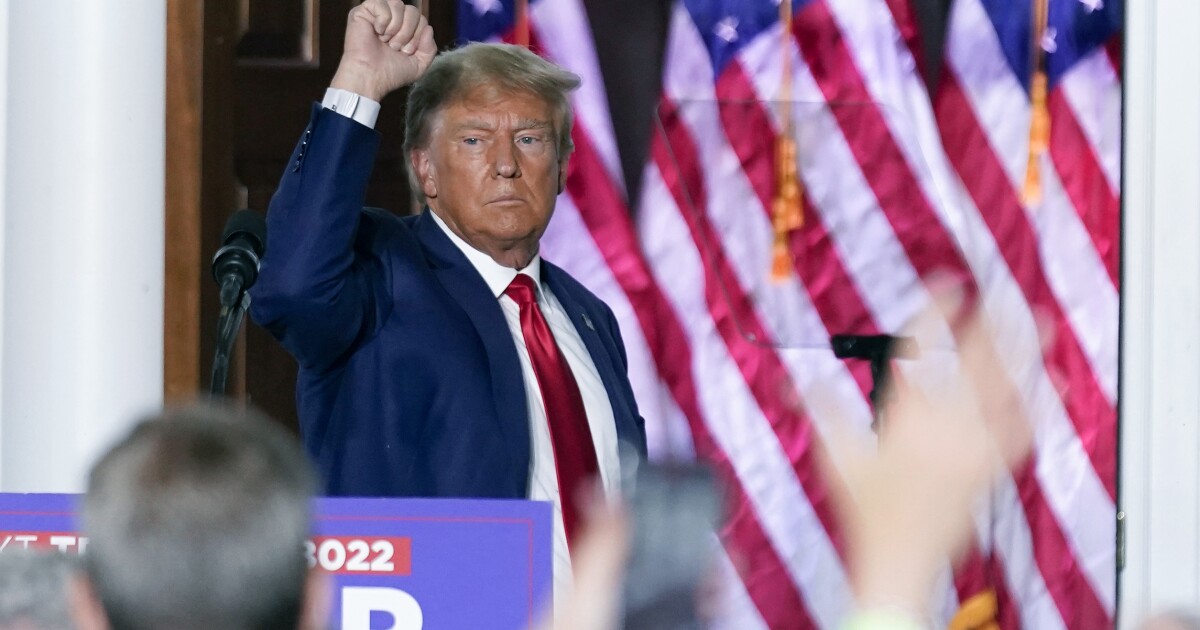

A week after former President Donald Trump’s federal indictment, the dilemma for the rest of the 2024 Republican presidential field is clear.
To go after Trump for his handling of classified documents risks putting a campaign on the wrong side of the Hatfields vs. McCoys feud that has dominated the national political scene since 2015 in a climate where the Republican base believes the federal government has been weaponized against conservatives generally and the former president specifically.
HOUSE PASSES FIRST BILL TO BLOCK FEDERAL GOVERNMENT’S GAS STOVE BAN
But to not try to use the opportunity presented by a 37-count indictment to convince Republican primary voters that they have better options than Trump in 2024 is to forfeit the game to the GOP front-runner before it starts.
Former Vice President Mike Pence and erstwhile U.N. Ambassador Nikki Haley have tried a little of both, decrying both the Justice Department’s prosecution of Trump and also their onetime boss’s conduct.
Haley in particular has used the second criminal case against Trump to make the argument that it is time to move beyond his “endless drama.”
Polling and focus groups reveal that even some current Trump supporters have a limited appetite for his temperament and tweets and would prefer to have the 2024 elections be a referendum on President Joe Biden. This line of attack reinforces those lingering doubts about Trump with months to go before the Iowa caucuses.
But it is also highly nuanced compared to Trump’s clear-cut argument that he is being targeted by the federal government under the leadership of his likely general election opponent. Nuance does not always win political arguments.
After years of investigations for collusion with Russian election interference, scrutinized in special counsel John Durham’s recent report and ending with a whimper in Robert Mueller’s, Trump can argue that this is the real election-interfering deal.
Most Republicans believe Trump has been treated unfairly since 2015. His strongest supporters have low trust in institutions and voices that will try to differentiate the severity of his handling of sensitive government information from that of Biden, Pence, or Hillary Clinton.
Trump’s argument may not prevail in a court of law. But it could easily carry the day in the court of public opinion, at least among the voters who will decide the next GOP presidential nominee.
The Republican presidential candidates who have most forthrightly chastised Trump on the classified documents, former New Jersey Gov. Chris Christie and former Arkansas Gov. Asa Hutchinson, are both polling in the low single digits.
Gov. Ron DeSantis (R-FL) is the only other candidate with double-digit support. He has in effect run as Trump’s more disciplined heir, a relatively rare GOP midterm elections success story who is decades younger and constitutionally eligible to serve two consecutive terms.
Even this approach has its limits. DeSantis remained 30 points behind Trump in a national Quinnipiac poll after the second indictment. But it is nearly 20 points better than anyone else.
At the same time, candidates polling at 5% or less need to take risks. Everyone in the race other than Trump and DeSantis has based their campaign on something unpredictable and catastrophic happening to one of the top two contenders. Without that, they have no clear path to victory.
DeSantis’s campaign is premised on the need for a Republican nominee who will neither revert to the pre-Trump GOP nor be so easily distracted. But that implies that Trump is distracted or himself a distraction, as attempting to fight off at least two indictments while running against an incumbent president would seem to be.
All the non-Trump candidates for the Republican nomination need to convince primary voters that their abilities are superior to those of the front-runner. That includes both electability and availability, which Trump’s precarious legal situation could put in jeopardy.
The Republicans running against Trump need to do just that — run against Trump.
But that doesn’t mean they will necessarily win. In addition to Trump having the simpler argument to make to the Republican base, his once-listless campaign has been reinvigorated by the charges.
“This day will go down in infamy, and Joe Biden will forever be remembered as not only the most corrupt president in the history of our country but, perhaps even more importantly, the president who, together with a band of his closest thugs, misfits, and Marxists, has tried to destroy American democracy,” Trump thundered just hours after appearing in a federal courthouse in Miami. “They will fail, and we will win bigger and better than ever before.”
That might seem hyperbolic at best to swing voters in the Atlanta suburbs come November 2024. Yet would you bet against that message with caucus-goers outside Des Moines?
CLICK HERE TO READ MORE FROM THE WASHINGTON EXAMINER
It is also possible that by the third or fourth indictment, perhaps coupled with polls showing a growing Biden lead, Republicans could organically decide to move on from Trump without his GOP rivals having to do much more than keep themselves in position to reap the inevitable windfall.
Quietly Trump-skeptical Republicans have been waiting for that outcome through countless hair-on-fire news cycles, two impeachments, the 2020 election, Jan. 6, the midterm elections, and two arrests for eight years.






